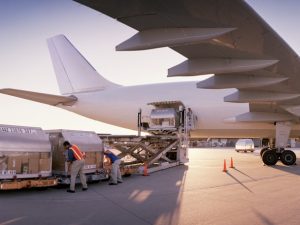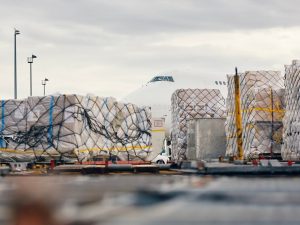Air One International has expanded its cargo fleet with delivery of a second Boeing 777F, which will be operated by its airline affiliate, One Air. The new aircraft arrived in the UK on 19 November following its handover at Boeing’s Everett production facility in the US. From its base at East Midlands Airport, One Air will deploy the freighter on scheduled services to Hong Kong, strengthening the carrier’s long-haul cargo capabilities. This addition follows the delivery of another 777F in August, placed into operation with One Air, marking a continued investment in the group’s growing air-cargo operations.
Read More »Softlink recognised as Best Tech Service Provider @ICA
Softlink Global was recognised as the Best Technology Service Provider for its innovative solutions transforming the air cargo ecosystem at the recently hel;d India Cargo Awards 2025. The award highlights the company’s contributions in automating cargo operations, streamlining digital documentation, and enhancing real-time visibility across terminals and airlines. By enabling seamless integration, supporting ESG initiatives, and empowering teams with smart, data-driven tools, Softlink Global has set a benchmark for technology adoption in the industry. This recognition underscores its pivotal role in shaping a more efficient, transparent, and future-ready air cargo sector.
Read More »DCSC gets Air Cargo Terminal Operator Award at ICA 2025
Delhi Cargo Service Centre was honoured with the Premier Air Cargo Terminal Operator Award at the recent India Cargo Awards 2025, recognising its outstanding performance and commitment to excellence in cargo handling. This achievement highlights the company’s dedication to efficient operations, advanced infrastructure, and superior service quality within the air cargo industry.
Read More »Etihad Airways orders three Airbus A350Fs for global ops
Etihad Airways has firmed up its commitment to next-generation freighters by ordering three more Airbus A350Fs, expanding its existing order from seven to 10 aircraft. The pact follows the airline’s initial A350F order placed in August 2022. Antonoaldo Neves, Chief Executive, Etihad Airways said the new freighters would add capability to the carrier’s cargo division as global demand continues to grow, noting the airline’s partnership with Airbus remains central to shaping a modern, efficient widebody fleet. The move had been widely anticipated, with Etihad Cargo previously indicating its intention to operate 10 A350Fs and confirming in late 2024 that it was negotiating to exercise options for three more. The airline currently operates five Boeing 777Fs and has said the shift toward the A350F is a logical progression given the presence of A350 passenger aircraft already within its fleet.
Read More »Glasgow Prestwick Airport plans to expand cargo ops in India
Glasgow Prestwick Airport is planning to expand its cargo operations in India in response to growing demand for Scottish salmon and whisky, Nico Le Roux, Business Development Director, PIK, said, while addressing delegates at the Air Cargo Southeast Asia Expo, Singapore. The development builds on the progress of the United Kingdom–India FTA, which will remove tariffs on Scottish salmon and reduce duties on Scotch whisky from 150 per cent to 75 per cent, with further cuts expected. “The Indian subcontinent, on the back of the recent Indo-Anglo trade agreement, is a key target for Glasgow Prestwick Airport for 2026,” said Nico Le Roux. “Scotland’s national export ambitions to India are well defined and Prestwick will provide an unrivalled European gateway for India’s pharma, medical equipment, and garment industries. “We are looking to mirror the collaborations we created with Chinese carriers and are seeking out full freighter airline partners to serve the Indian market. Expanding our connections with India will ensure faster, more efficient routes for Scotland’s key products to reach one of the world’s fastest-growing markets, while offering Indian manufacturers a superb hub in Europe,” added Le Roux.
Read More »‘One Airport, One Product’ to transform India’s cargo ops
Minister of Civil Aviation Kinjarapu Ram Mohan Naidu highlighted India’s immense market potential, skilled manpower and rapidly expanding cargo sector, while addressing the 11th Global Aviation Air Cargo Conclave, themed “Gateway to the Skies: Elevating India’s aviation, air cargo and MRO ecosystem for global leadership”. He said India’s air cargo volumes have grown by 47 per cent over the last decade, positioning the country 6th globally in total air cargo volumes, 3rd in domestic freight, and 12th in international freight. With cargo-handling capacity now at 8 million MT and growing at over 10 per cent annually, India has set ambitious targets to reach 10 MMT by 2030 and 21 MMT by 2047. The Minister emphasised major initiatives, including the PMGS scheme, NLP, and creation of a unified national market through GST, have been critical enablers of this progress. With India currently accounting for only 2.9 per cent of global air traffic, he underlined the vast untapped potential ahead. He shared initiatives such as transforming airports into cargo hubs for local production, promoting regional exports, such as frozen fish from Agartala and tea from Dibrugarh, and operationalising the ‘one airport, one product’ concept inspired by the PM’s ‘one district, one product’ vision.
Read More »SpiceXpress wins Best Airline & LSP Award
SpiceXpress & Logistics was presented with the Best Airline and Logistics Service Provider Award recently at the India Cargo Awards 2025, recognising its exceptional performance and consistent commitment to excellence in the air-cargo and logistics sector. The accolade highlights the company’s advances in operational efficiency, customer-centric solutions, and innovative service offerings, further strengthening its position as one of the leading logistics players in the country.
Read More »‘Global conflicts disrupted supply chains, increased costs’
Keku Bomi Gazder, MD and CEO, Aviapro Logistic Services said, “Geopolitical events, regulatory changes, and shifting trade patterns have had a significant impact on our business operations. Global conflicts and regional tensions disrupted supply chains, increased transportation costs, and led to fluctuations in fuel prices, affecting logistics planning and profitability.” Evolving trade policies, such as changes in import-export regulations and tariff structures, have required constant monitoring and adaptation to ensure compliance and cost efficiency. “Also, the focus on sustainability and stricter environmental regulations have prompted investments in greener technologies and more transparent supply chain practices. Trade realignments and diversification of sourcing markets have encouraged us to strengthen partnerships in emerging regions to mitigate risks,” he added
Read More »Global cargo ops resume at Visakhapatnam Airport
International air cargo operations resumed to Visakhapatnam Airport after a halt that had remained in place since the pandemic. Union Civil Aviation Minister K. Ram Mohan Naidu announced the resumption, while addressing the 30th CII Partnership Summit recently. K. Kumar Raja, D.S. Varma, and O. Naresh Kumar, Members of the Andhra Pradesh Air Travellers Association (APATA) said the move will come as relief to exporters across the region. For the past few years, companies in sectors such as pharma, medical devices, textiles, and other manufacturing units located in the Pharma SEZ, AP MedTech Zone, Textile Park, and the Visakhapatnam SEZ had no option but to ship their cargo through Hyderabad or Chennai. This workaround increased transport costs and stretched delivery timelines, affecting competitiveness.
Read More »October cargo volumes up 4% YOY: Xeneta
Global air cargo volumes growth slowed down in October but still recorded a stronger than expected 4 per cent rise year-on-year, despite the easing of frontloading of imports by businesses countering the cost of tariffs and effects of the US de minimis ban, Niall van de Wouw, Chief Airfreight Officer, Xeneta. The latest monthly data supports its forecast in September of an overall 3–4 per cent growth in demand for 2025, but more worrying trends indicate challenging times ahead for airlines and forwarders as the market is “starting to favour shippers more than it has for the past few years,” he said. October saw a sixth consecutive monthly fall in global air cargo spot rates, with a 3 per cent decline year-on-year to US$ 2.58 per kg. Seasonal contract rates, valid for over a month, fell even faster than spot prices. Averaging US$ 2.31 per kg, they were down 8 per cent year-on-year, reflecting a subdued outlook among forwarders and carriers.
Read More » Cargo Breaking News
Cargo Breaking News









